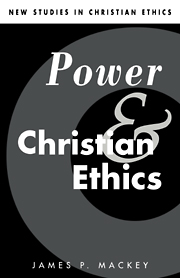Book contents
3 - Powers secular and powers sacred
Published online by Cambridge University Press: 05 November 2011
Summary
The task of identifying powers secular and powers sacred, and of then appreciating the differences and similarities between them, can coincide with that of discussing the relationship of morality and religion, and of deciding where that relationship lies on a range between the extremes of overlap and incompatibility. Naturally, if powers sacred can only appear in the form of power as force, the relationship of religion to morality will occur at the extreme of incompatibility; if powers sacred can be discovered which manifest themselves as power in the form of authority, the relationship of religion to morality will involve overlap.
The issue of distinction and relationship was raised by some observations of Alasdair MacIntyre's on Greek and Christian morality in the course of the last chapter. MacIntyre felt that the true and adequate goal of moral striving must be found in the human soul's relationship to something at once outside itself and beyond the world; he also felt that our common experience of the human inability to keep evil temptations at bay pointed to the need for something like the faith, hope, and charity which Christians call ‘infused’ virtues. These observations call for a number of comments.
First, even were such elements absent, the resulting morality need not necessarily be deemed lacking in properly religious dimensions.
- Type
- Chapter
- Information
- Power and Christian Ethics , pp. 82 - 150Publisher: Cambridge University PressPrint publication year: 1994

